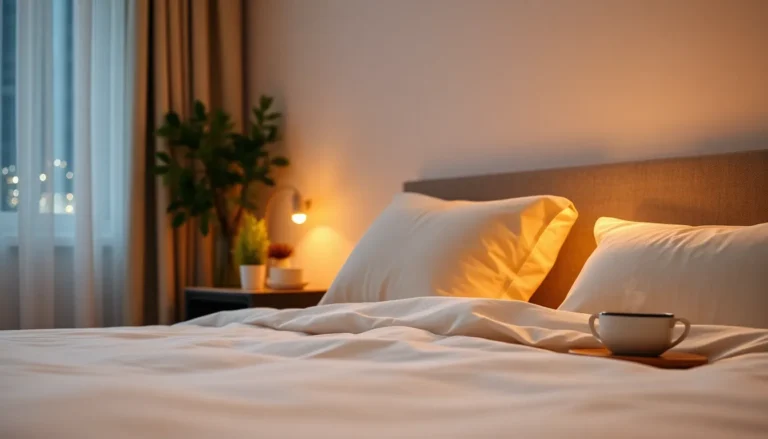Ever wondered if the direction you sleep in could affect your dreams? While it might sound like a quirky bedtime story, sleep direction has roots in ancient practices and modern science alike. Picture this: you’re nestled in your cozy bed, but did you know that the way you face could influence not just your sleep quality but also your overall well-being?
From north to south, east to west, the debate rages on. Some swear by the benefits of sleeping with their heads pointing north, while others argue for the power of east-facing slumber. As they say, “you are what you sleep,” so why not explore how the compass could lead you to dreamland? Get ready to dive into the fascinating world of sleep direction and discover if your nightly routine is a snooze or a real game changer.
Table of Contents
ToggleUnderstanding Sleep Direction
Sleep direction plays a crucial role in influencing dreams and overall well-being. Analyzing its impact reveals varying perspectives across cultures and disciplines.
Definition and Importance
Sleep direction refers to the orientation of the body during sleep. It encompasses various alignments such as north, south, east, or west. Research suggests that this alignment affects both physical and mental health. Studies indicate that sleeping with the head pointing towards the north can promote better circulation, while an eastward position may enhance creativity. Understanding these effects helps individuals optimize their sleep environments and routines for improved wellness.
Cultural Beliefs Around Sleep Direction
Cultural beliefs significantly shape perceptions of sleep direction. In some cultures, aligning the body with magnetic fields influences health and spirituality. For instance, traditional Chinese medicine often suggests sleeping with the head towards the east to encourage vitality and harmony. Indian Ayurveda similarly promotes specific orientations for restful sleep. Meanwhile, Western science tends to focus on comfort and personal preference. These varying beliefs underscore the significance assigned to sleep direction beyond mere preference.
Scientific Research on Sleep Direction
Research indicates that sleep direction plays a significant role in sleep quality. Studies reveal that individuals sleeping with their heads facing north often experience deeper sleep cycles. Participants in various experiments reported feeling more rested and alert when adhering to this orientation. In contrast, some findings suggest that an eastward position might stimulate creativity and enhance dreaming.
Effects on health and well-being extend beyond just sleep quality. The alignment of the body with the Earth’s magnetic field may influence overall wellness. Some investigations highlight improved circulation linked to northern orientation. Other studies connect sleeping east with an uplifted mood and reduced stress levels. Exploring these relationships offers insight into how sleep direction could impact physical health and mental clarity.
Practical Applications of Sleep Direction
Understanding sleep direction can enhance sleep quality and overall well-being. Various factors influence the effectiveness of specific orientations during sleep.
Choosing the Right Sleep Direction
Selecting the appropriate sleep direction involves considering both personal comfort and cultural beliefs. Research indicates sleeping with the head pointing north may promote improved circulation. Other studies suggest an eastward orientation can enhance creativity and elevate mood. Familiarity with one’s sleeping patterns plays a crucial role in selecting the right direction. Individuals should experiment with different orientations to determine what feels best for their unique needs.
Tips for Implementing Sleep Direction in Your Routine
Incorporating sleep direction into a nightly routine can improve sleep quality. Begin by observing current sleep patterns and how they affect restfulness. Try to position the bed according to preferred orientations. Utilize calming materials like breathable sheets to enhance comfort. Also, maintain a consistent sleep schedule to reinforce the body’s natural rhythm. Experiment with various sleep positions while taking note of their impact on mood and creativity upon waking.
Common Misconceptions About Sleep Direction
Many misconceptions surround sleep direction, often leading to confusion. Understanding the truth behind these myths can improve sleep quality and health.
Myths vs. Facts
Many believe that sleeping in a specific direction guarantees better health. However, research shows varying effects, depending on individual factors. Studies indicate that sleeping with the head pointing north may enhance blood circulation. It’s proven that the benefits linked to orientations often differ among individuals. Another myth is that eastward sleeping universally boosts creativity. While some may experience enhanced mood, scientific backing remains weak. Recognizing these myths clarifies the importance of personalized sleep practices.
The Role of Personal Preference
Personal preference plays a significant role in sleep direction. Individuals often prioritize comfort when choosing a sleeping orientation. Many factors influence these preferences, including bed positioning, room layout, and noise levels. Research suggests that comfort has a more substantial impact on sleep quality than strict adherence to specific orientations. Choices in bedding materials also contribute to sleep satisfaction. Feeling relaxed and secure can lead to deeper sleep cycles. Thus, experimenting with different orientations may help individuals discover what truly benefits their rest.
Exploring sleep direction opens up new avenues for enhancing well-being and sleep quality. By understanding the potential benefits of different orientations individuals can tailor their sleep environments to better suit their needs. Whether it’s aiming for better circulation by sleeping north or fostering creativity by facing east the choice ultimately lies in personal comfort and preference.
Cultural beliefs and scientific insights provide valuable context but individual experiences should guide decisions. Encouraging experimentation with sleep positions can lead to improved rest and overall health. As individuals gain awareness of how sleep direction impacts their lives they may find a more restful and rejuvenating sleep experience awaits them.



